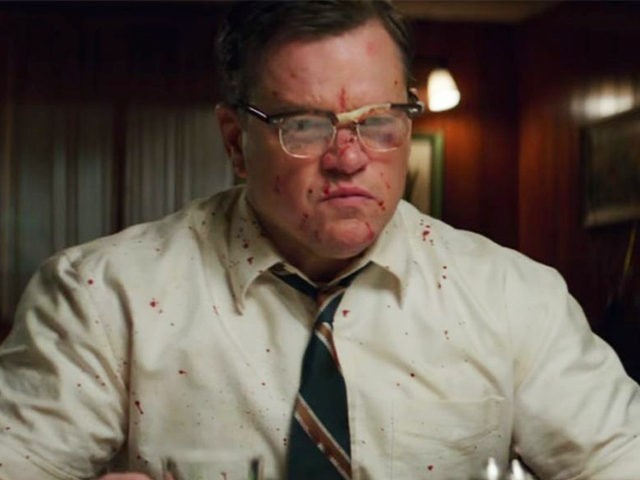In the mid-eighties, Joel and Ethan Coen came up with an idea and some ten years later, approached George Clooney with the screenplay. That project never happened. But Clooney was so enamored with it that he decided to rewrite (with producing partner Grant Heslov) the 30-year-old script and direct it himself. The result is Suburbicon and, due to its many failures, an all-new appreciation for the endlessly gifted brothers Coen.
Suburbicon is an inferior mash-up of the Coens’ unforgettable 1996 Fargo and 2009’s somewhat forgettable A Serious Man. On one side, you have a blacker than black comedy of everyman Gardner Lodge (Matt Damon) committing an unspeakable crime. On the other, there is provincial Hollywood’s oft-stated certainty that only malevolence lurks beneath the perfectly trimmed lawns of post-war suburban America.
Clooney has the chunks required to make a great Coen brothers’ film, beginning with their screenplay. Then there is the $25 million budget, Damon, Julianne Moore, Oscar Isaac, a never-ending supply of offbeat character actors, and Robert Elswit’s superb photography. Clooney assembled a pretty solid band. As a conductor, though, he lacks the chops to make anything resembling music.
Other than Isaac’s one superb scene as a sideways insurance investigator, none of the characters ever come close to popping to life. If you recall, despite all the awful things he was guilty of, one of the many genius elements in Fargo is that you still rooted for William H. Macy’s Jerry Lundegaard to get away with it. Even as you were horrified by his escalating behavior, the pathos, the rich emotional life within that character, kept you on his side.
Damon’s Lodge has no inner life. You feel no empathy towards him or towards Julianne Moore’s dual characters. They are only despicable, white bread gone bad. These are not characters; rather, they are logos for Clooney’s undying belief in his own superiority over such people. On top of a weak script and bad direction, Damon and Moore (and, therefore, the audience) are also the victims of the talent they lack to overcome both — to broadcast our shared humanity without ever saying a word.
Another reason a Wisconsin boy like myself can love Fargo, which satirizes me and mine, is that beneath all the violence and funny accents, the Coens cannot hide their affection for us. And a real affection for their characters is always the difference between an A+ Coen experience (Blood Simple, Fargo, Miller’s Crossing, Raising Arizona, the grossly under-appreciated Man Who Wasn’t There, No Country for Old Men, True Grit) and a lesser Coen entry (Burn After Reading, Intolerable Cruelty, The Huduscker Proxy), which can come off as a bit smug.
This is primarily what so undoes Suburbicon. Clooney’s muse is his sanctimonious hatred for normal Americans, those he sees only as cancerous racists, marginally intelligent hypocrites, and vessels of quiet desperation — you know, because deep down inside, we really all want to be like George.
If you care not a whit for the characters, even the villains, there is no tension. Suburbicon is utterly and completely tension-free. Even the little boy Nicky (a winning Noah Jupe) feels like a plot device, a cheap way to fabricate suspense by putting a child in danger. Clooney deserves credit for not making Nicky clever, a conjurer of unrealistic solutions, but the kid has no personality, and thanks to the trailer, we already know the outcome of the scene where we should be most worried about him.
As good as Oscar Issac is (in everything), screenwriter Clooney even bungles this. We are promised a character of consequence who will be around awhile. Then he is abruptly removed. Same with Jack Hightower’s policeman, who just never comes back. Gary Basaraba’s Uncle Mitch is wonderfully realized but has so little screen time, it leaves you annoyed as opposed to wanting more.
The well-constructed plot moves smoothly from scene to scene; you just do not care. Visual jabs at generic, fifties suburbia are everywhere; you have just seen them all before. The irony of the American dream permeates every scene, but this has been a tired trope since the credits rolled on 1999’s American Beauty.
On top of all that is an intrusive score and, worst of all, a racially condescending subplot that belongs in another movie. Based on a true story, a sorry chapter in American history, and Clooney’s transparent desperation to elevate his pulp into something meaningful and important, a black family makes the mistake of moving into Suburbicon. What starts off as shocked snobbery ends in a full-blown race riot.
The Meyers’ story has two insurmountable problems. The first is that it never connects to the rest of the movie. Even thematically, unless you count white people suck, it just does not belong. Secondly, because Clooney’s racial attitudes are still ironically stuck in the fifties, his black characters are (mostly) silent and oh-so-noble sufferers — tokens of Clooney’s woken enlightenment, limousine drivers of his pious liberalism, and, therefore, anything that might make them living, breathing people is pushed to the back of the bus.
Suburbicon is Clooney’s sixth directorial effort and fifth shot at screenwriting. How many swings does this guy get before his bubbled worshipers in Hollywood and the entertainment industry wake up to the fact that he is, at best, a mediocre talent? If the box office is any indicator, normal Americans caught on a decade ago — which might explain why he hates us so.
*This article has been updated to correct the title of A Serious Man.
Follow John Nolte on Twitter @NolteNC. Follow his Facebook Page here.

COMMENTS
Please let us know if you're having issues with commenting.